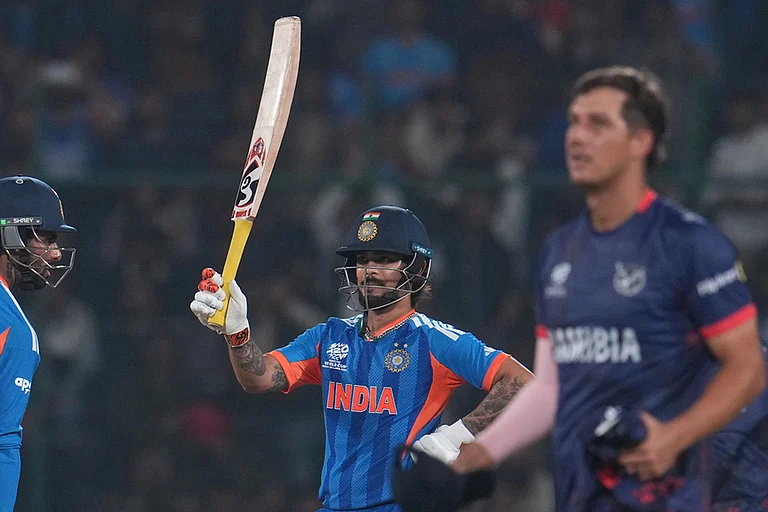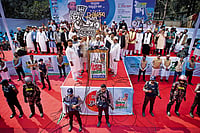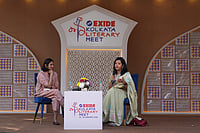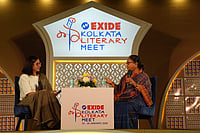Political gamesmanship involving rival claims over the legacy of a national icon reached an apogee on January 23. That day, the stage was set for Prime Minister Narendra Modi to offer tributes to Netaji Subhas Chandra Bose on his 124th birth anniversary, setting the stage for yearlong celebrations. West Bengal chief minister Mamata Banerjee had accepted the Union culture ministry’s invite to share the dais with Modi at Victoria Memorial Hall, where a mega show had been organised, including musicals and a son et lumiere.
But the sudden eruption of ‘Jai Shri Ram’ chants by a section of the audience the moment Mamata was to deliver her speech added an unforeseen twist to the tale. Instead of Modi’s long speech eulogising Netaji, Mamata’s refusal to speak became the leading news. Following the event, TMC leaders condemned the slogans not only as an insult to the CM but an insult to Netaji, who epitomised communal harmony and was a vehement opponent of communal politics. The BJP’s counterattack followed old lines—accusing Mamata of being anti-Hindu because of her aversion to the slogan and also of insulting Netaji by refusing to speak over such a trifle.
But, as reports on Bengali newschannels, newspapers and websites reveal, the incident irked many Bengalis. Netaji’s opposition to Hindutva politics turned out to be the talking point. If some senior Bengal BJP leaders are to be believed, the PMO expressed its displeasure about the whole thing.
“Those who shouted Jai Shri Ram during the event have spoiled Modi’s hard work to appropriate Netaji. The BJP’s Bengal unit has scored a same-side. I have information that the PM wants the state unit to find out who were behind it and censure them,” says pshephologist Biswanath Chakraborty.
Ideally, the saffron camp would hardly have a scope to claim the legacy of Netaji Subhas Chandra Bose, the most iconic of Bengal’s many freedom fighters. Bose had been a staunch critic of communal politics and had bracketed the Hindu Mahasabha with the Muslim League. He never spoke well of Hindutva ideologue V.D. Savarkar and his rivalry with Syama Prasad Mookerjee, the BJP’s principal Bengali icon, is also well-known. Bose’s writings and speeches are replete with criticism of Hindu nationalist politics, as it is about Muslim separatism. Most major issues facing the people were faced by all communities alike, he insisted.
When the BJP started gaining popularity in the state from 2017, it triggered the birth of a secular Bengali sectarian movement whose members highlighted Bengal as the land of Netaji where the bearers of Mookerjee’s ideology had no place. This feeling coexisted with the older beliefs about Netaji being wronged by Congress leaders like Gandhi and Nehru and conspiracy theories involving Nehru vis-à-vis Bose’s ‘mysterious’ death.
However, Modi started highlighting, first Sardar Vhallabhbhai Patel and then Netaji, in a bid perceived to undermine the role of Jawaharlal Nehru, whose kin lead the Indian National Congress till date. From 2015, he started stating that Netaji had been deprived of due credit and recognition. By the virtue of having highlighted Netaji over the past four years, Modi has created an advantage for himself to lay a claim on his legacy, even as political history stands against him.
The Trinamool Congress, too, has a nativist claim on Bose’s legacy—they have been consistent in seeking the declassification of files concerning Netaji lying with the Centre. The party’s Rajya Sabha MP Sukhendu Sekhar Roy raised the issue several times. Mamata herself took the lead—in September 2015, she made public some files, then dared the Centre to declassify the Netaji files in its possession. A month later, the Centre announced that it would start declassifying files on Netaji. That was the beginning of Modi’s attempt to use Bose as a political weapon against his primary rival, the Congress.
In December last year, soon after Mamata announced a committee comprising Nobel laureates Amartya Sen and Abhijit Banerjee, along with some of Bengal’s cultural luminaries, to plan a year-long celebration for Netaji’s 125th birth anniversary, the Centre, too, announced a similar panel, and made Mamata one of its members.
Ahead of this year’s January 23 celebration—an event that has been celebrated across Bengal for the past seven decades—the BJP’s Bengal unit president, Dilip Ghosh, used Modi’s pronouncements on Netaji as a primary weapon to lay claim to his legacy. In a Facebook post, Ghosh reminded people that in October 2018 the PM had hoisted the Tricolour in the Red Fort to pay tribute to the Azad Hind government on its 75th anniversary, that in December that year he had renamed Ross Islands in Andamans after Netaji to commemorate the 75th anniversary of the hoisting the Tricolour for the first time, and that in 2020 a museum was opened in the Red Fort and INA veterans invited to the Republic Day parade.
In January, TMC’s Roy demanded that the Centre publish a book on the Azad Hind Fauj, edited by historian P.C. Gupta at the initiative of the history division of the defence ministry decades ago, which has been lying for years. Roy claimed to have received an anonymous letter citing an official note exchanged between the ministry of defence and the ministry of external affairs that revealed that pages 186-191 of the book contained information that would strengthen the view that Netaji did not die in a plane crash in 1945. “I had written to the PM last year. He acknowledged my letter but, unfortunately, no steps had been taken,” says Roy. This time, BJP Rajya Sabha MP Swapan Dasgupta was quick to repeat the demand in a tweet on January 21.
The incident at Victoria Memorial broke the rhythm so carefully built up, not only by Modi but also the Rashtriya Swayamsevak Sangh, nationally and in Bengal, to exploit public sentiments about perceived injustice to Netaji by Nehru and the next generation. “The party has identified two youth wing leaders who came from the TMC behind the Victoria incident. They will be questioned and censured. We may publicly go on the offensive against Mamata for reacting to a Hindu slogan, but the party is aware that the incident damaged the party’s Bengal plan,” says a senior Bengal BJP leader.
The unsavoury occurence even earned criticism from Adhir Ranjan Chowdhury, one of Mamata Banerjee’s harshest critics, who said that the BJP not only insulted an elected chief minister at a government function but also showed utter disrespect for Netaji.
Two days later, in her first public rally, in Hooghly district, after the incident, Mamata referred to the slogan chanters as “rabid communal traitors”. Netaji was a leader who unified all communities in India, she said. Subsequently, the TMC has intensified its ‘outsider’ campaign against the BJP, saying it knows nothing about Bengal and had no respect for Bengal’s cultural icons. “Even before, they insulted Rabindranath. Their leader (J.P. Nadda) said Tagore was born in Santiniketan…. They broke the statue of (Ishwarchandra) Vidyasagar. They garlanded someone else’s statue, claiming it was that of Birsa Munda,” the chief minister thundered on January 25.
In this open season of electoral tussle, giants who strode the pages of history are very much a part of the hurly burly of the present.
By Snigdhendu Bhattacharya in Calcutta


























